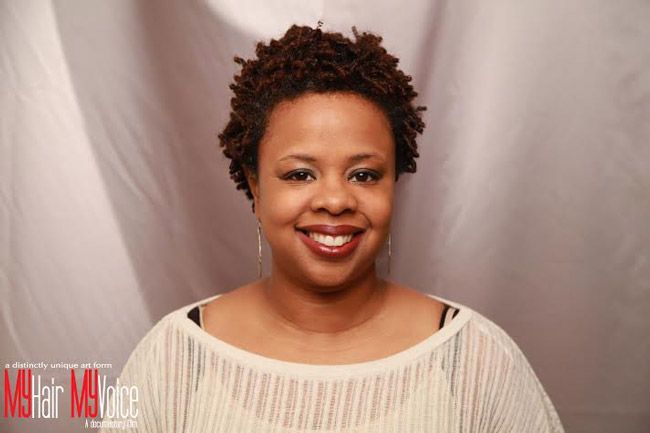
NaturallyCurly community member Nadirah Iman is in the process of developing the natural hair documentary, My Hair My Voice, and we’re thrilled to share her project and her story with you. Iman and her producing partner have spent the last two years working on the documentary and here is what she has learned in the process.
What is the goal of your film?
The goal of My Hair My Voice is to celebrate the artistic expression of Black hair.
As my producing partner, Quenell Jones, and I began conceptualizing and developing this documentary, we wanted to present a new idea about Black hair. We settled on approaching the subject as an Art form.
For example, some methods of “Locing” resemble the process of creating Fiber Art while Afro textured hair has the ability to be manipulated into various styles much like the process of sculpting. My Hair My Voice’s goal is to look beyond the social and political implications of Black hair and open the door for a different perspective, which is to admire the beauty and diversity of Black hair.
In the earlier stages of filming this documentary, we decided to take our audience on the journey with us to completing this film. By posting relevant material to our social media pages like historical and scientific information, Art series pertaining to Black hair, to teaser trailers showcasing the footage that we have filmed thus far; we wanted to build a community around the process of making My Hair My Voice.
Is there anything you’ve learned in the process of making this film that surprised you?
Yes, there have been many discoveries that have been quite interesting and intriguing. One example in particular is how the word Natural is defined within Black communities across parts of America. Thus far we have interviewed over thirty women including hair care professionals from Chicago to New York. In those communities, Natural hair has a different meaning and significance. Another example that I have observed is the controversy over the Number system and its effectiveness within the Natural hair community.
How has making this film affected your own natural hair journey?
Producing My Hair My Voice has made a huge impact on my natural hair journey. During the research and development phase of making this documentary, I was in the early stages of my transition to natural. While educating myself about how to take care of my hair at the different phases of growth, my knowledge of my own hair and Black hair in general accelerated. For example, by researching the scientific aspects of Black hair, I’ve learned how to discern which ingredients in products work best for my hair. Furthermore, since my natural hair journey plays a significant part in this documentary as well as gaining a solid understanding of the history of Black hair and beauty culture; this information has helped me to confront my perceptions of my own hair, which allowed me to appreciate it even more.
Tell us about one of the people you’ve interviewed for the film?
One of the many professionals that we have had the opportunity to interview was Karen Tappin Saunderson, owner of Karen’s Body Beautiful. She gave us the opportunity to tour her production facility and provided insight into her inspiration to producing the product line.
There have been other hair documentaries, what did you feel was missing from the conversation that you wanted to shed light on with your film?
Diversity in the Natural hair community helps define this new movement and how My Hair My Voice wants to contribute to this vibrant conversation is with viewing Black hair culture as an artistic expression.
My Hair My Voice wants to investigate the diversity of hair textures and hairstyles styles, such as the evolution from the Press-N-Curl to the Jheri Curl, the birth of the Afro as a political symbol, the rise of the weave, to the reemergence of the Natural hair movement as a form of self-expression.
You’re currently raising money through your Indiegogo campaign, what will the money raised go towards funding?
For making a contribution to the My Hair My Voice Indiegogo campaign you are supporting career filmmakers who have been developing and researching this feature film for the past two years. To enrich the brevity of our historical section, we will need archival footage and photographs of pioneers like Madame CJ Walker, imagery of Black hair during the civil rights movement, and political figures such as Angela Davis with her iconic Afro. Also, we want original music that would bring life to the originality of the film.
For making a contribution you will help provide travel expenses to places such as Atlanta and Louisiana that have a rich history of Black hair culture.
For aspiring filmmakers or anyone reading this who may want to start a creative endeavor like this one, how did you get started making this film?
For us it started with the evolution of one idea, and with that came the enthusiasm to develop and research it. And lastly, your dedication to the completion of the project, by any means necessary.
You can follow this project at:
www.myhairmyvoice.comhttps://www.facebook.com/





